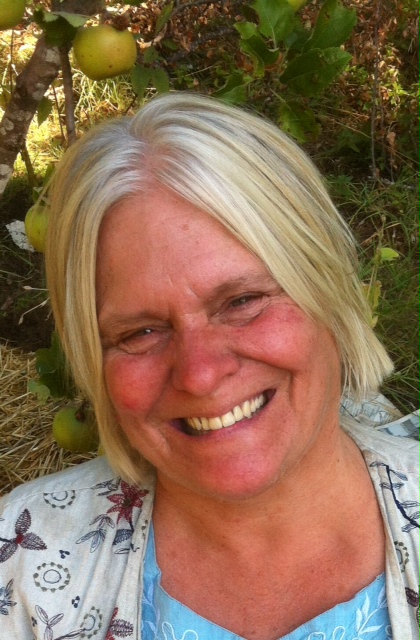
Charlotte Anthony started out as a biodynamic farmer more than 45 years ago. Most recently she spearheaded the volunteer organization, Victory Gardens for All, which installed 650 gardens in Eugene, Oregon from 2008 – 2012. Charlotte has recently moved to Ananda Laurelwood in Gaston, Oregon to start-up food production for the emerging eco-village. Charlotte’s philosophy is that most of us long for connection; “I live with the earth, the plants, the trees, the animals around me. They tell me what they need and, by providing it as I can, I receive a sense of belonging.”
Charlotte comes from a long line of Danish peasants and has gardened since she was a child. In 1967 she did her first major garden while living in a back to the land community in New Hampshire. She picked and pruned for several commercial orchards, and converted a long-abandoned 15-acre apple orchard to the first organic apple orchard serving health food markets in Boston. During this time she studied biodynamic methodologies and was asked to present on organic apple growing at several events of the New England Apple Growers Association and the New Hampshire Extension Service.
Victory Gardens
In 1970 she was asked to join an aspiring biodynamic farm in New Hampshire where 15 acres of vegetables were grown and marketed through the Natural Organic Farming Association which she helped to form. Due to her natural farming ability, including knowing when to plant, when to harvest, how to observe the plants and the soils, and what to do when they were not growing well, she soon was asked to manage the farm.
In 1974, she planted a biodynamic fruit orchard at the farm in New Hampshire. The owner of a 300-acre commercial orchard where she had been managing apple picking crews and pruning crews came to observe the new organic orchard. Soon after working with Charlotte on her organic orchard, he became one of the first commercial apple growers to use integrated pest management, with good returns.
In 1975 she was called to diversify her skills by attending chiropractic school and learning to work with humans. In 1980 just before she started practice as a chiropractor, she had a landmark project at a farm in New Hampshire for her spiritual community where she fed 5000 people with most of their food including tomatoes, corn, and beans in July after starting just that spring. Having all this food ready in July was so unheard of that they wrote about it in the Concord newspaper, the big city more than an hour away. Charlotte started her chiropractic practice in 1980 in Oregon. She had great success rates in chiropractic, receiving referrals from doctors in the surrounding 5 states for chronic problems including cancer. However, she had a strong sense that patients would do better if they learned to listen to their intuition and not yield authority to a doctor. In 1985 she again grew a major garden for her meditation retreat in New Hampshire, and in 1986 she moved to Minnesota and began another career, buying and remodeling old homes. In 2002, her mother died after a relatively benign stroke and 17 medical errors. She started an advocacy program so that people might know how to claim their own health and advocate for their loved ones.
In 2002, Charlotte went to Colorado to do a large CSA, and then in 2004 to New Orleans to serve after Hurricane Katrina. In addition to working on a bioremediation project, she became the on-site coordinator for the permaculture gardens which had been severely damaged after Katrina, where she worked with as many as 80 volunteers a day who had come to help after Katrina. In 2007, Charlotte began the Victory Gardens project in Eugene, Oregon. “We bring 4-6 volunteers and start a 10 x 16 or larger garden, complete with soil amendments, compost, and plants in 4-5 hours. We use a no-till gardening system. The folks who receive gardens pay it forward by working on the next gardens. Through November of 2011, we completed 650 gardens in the Eugene area. Folks pay $75.00 for their new garden. The gardens are as sustainable as we can make them, including dynamic accumulators, medicinal plants, either in the garden space or near the garden space, connected with mycorrhizals.”
“Victory Gardens for All grows all the plant starts for the program. We added food forests to the victory garden program in 2010. We have 2000 fruit trees growing on several different properties which we have grafted onto rootstock with volunteers from the community. The intention for these plants is to start food forests and to plant in people’s yards and in places with public access. The food forest is a very diversified orchard with fruit and nut trees, and companion planted with dynamic accumulators, medicinal plants, and all types of perennials including vines, root crops, and berry bushes. We also plant some self-seeding annuals such as potatoes, summer and winter squash, kale, and arugula.”
Charlotte has written two books: Surviving Health Care in America and 101 Ways to Supercharge Your Energy.
The Mother Who Plants Trees: “Just before my 69th birthday I awakened in the night hearing a message which said I was to be in India by November 22, 2013. I had less than a month to get ready. One miracle following another I got on the plane for India on November 25, 2013.
Once in India, I was led on an odyssey crisscrossing India many times leading me to farmers who were running out of water to farm. Ultimately I learned that in India there was a 10,000-year history of sustainable agriculture. I realized that my whole life had led me to this point. By using dryland agriculture traditional Indians had been using a way of farming that could bring back our ecosystems around the world, thereby stopping floods, droughts, and fires. We could stop using chemicals, use permaculture and natural farming, plant trees, and practice what is called water conservation in India (swales, key lines, ponds, etc.) This is called restorative agroforestry, or agroecology and a new name is carbon farming. The main difference is these technics and the techniques which have destroyed ecosystems around the world, is these techniques work with soil biologies. Amazingly these methods use almost zero inputs and get higher yields, so they can really help the farmers. We are enheartened to see that there are at least 5 consultancy firms helping industrial farmers apply biological technics on their farm.
Comments from previous students
- What I learned help take me from analysis paralysis to action. Action, no matter how imperfect, creates a deeper understanding.
- I learned to slow down and observe deeply, digging into the soil with my hands. By doing that, I got to know my land more deeply.
- Kept me motivated.
- I learned from my and others’ mistakes, and most importantly that I shouldn’t let the fear of making mistakes stop me from getting out there. It was a strong habit to overcome, growing up in a house where “if you can’t do something right, don’t do it at all” was the prevailing rule. That perspective was stopping me from putting a shovel in the ground and sowing a single seed. Now I’m making a mess and making beauty, and feeding my family.
- I now have more curiosity.
- This class provided a lot of experiential learning (waking up a place deep inside myself).
- I now trust my intuition.
- I learned how important diversity is, and having a lot of roots in the ground.
- I notice I observe more deeply, and I’m open to what I observe as opposed to fighting it (thinking that is not what I should be seeing). I used to follow advice or instructions, and if things didn’t work, I thought I must’ve done it wrong, but now I see how to observe more effectively and trust what my garden is telling me.
- I learned essential steps that helped my soil quality improve and my plants grow better.
